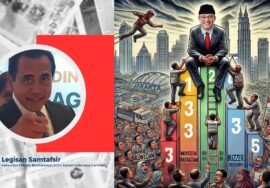
Hajj Season: A Momentum for Strengthening National Integrity (Part 2)
But it must be reviewed and prepared: what is the target to be achieved after Hajj.
The Call to Hajj
It has come again,
To perform the worship,
The call of the House of Allah…
Yes, the Hajj season has arrived. Pilgrims will begin entering the embarkation phase on May 1st, 2025, and the first departure will be the next day. The excitement of 221,000 Indonesian Hajj pilgrims heading to the Holy Land of Makkah is a truly magnificent spectacle. If this were a cultural delegation, it would be a world-class colossal performance. If it were a military convoy, it would be a bulldozer smashing enemy fortresses. If they are citizens of a nation, then they are ‘agents of national reform’ upon their return from Hajj.
It depends on how we see it. In principle, all acts of worship in Islam are not revealed in a vacuum or without context. For example: “Establish prayer to prevent immorality and wrongdoing”; “Fast so that you may attain piety”; “Worship so that you may become pious”; “Take provision, but the best provision is piety”; “Be pious so that you may become the most noble.”
So, all these ritual acts of worship contain a context of outcome—what is meant to be achieved. Striving for that outcome is actually a model of purposeful and productive action. Therefore, it’s not just about performing the ritual, not merely about going through the motions, but about strongly emphasizing the achievement of the intended outcome.
The same goes for Hajj; it’s not enough to merely perform the pillars and conditions, not enough to see it as a ritual without outcome. It must be viewed and prepared with clarity: what is the target to be achieved after Hajj?
In other words, while Hajj is a religious ritual, if we use such a model of thinking, then from the Hajj we truly hope to see real outcomes. Upon their return, will we truly witness national improvement?
Hajj and the Nation’s Integrity Emergency
Integrity emergency?
Yes, Indonesia is facing various emergencies. As stated by Dr. Abdullah Hehamahua, former advisor to the Corruption Eradication Commission (KPK) from 2005–2013 and currently Chairman of the Syuro Council of the Masyumi Party, “Indonesia is currently experiencing five simultaneous crises: corruption, drug abuse, family disintegration, law enforcement, and nationalism. The root of all these crises is none other than the crisis of integrity.”
Take, for example, the IPSOS Global Trustworthiness Index 2023, which shows that public trust in the police is only 27%, in government employees 32%, and in politicians just 24%. Data from the KPK shows that from 2020 to 2024, there were 2,730 corruption cases handled. From 2004 to 2019, the number of cases surged alarmingly—from just 27 cases to 736 (www.kpk.go.id).
In terms of the family crisis, data shows divorce cases increased by 15–20% from 2010 to 2015. But from 2015 to 2020, the increase reached 72%. As for the drug emergency, the prevalence rate is 1.7%, meaning that 3.3 million Indonesians aged 15–64 are abusing drugs (BNN-RI).
The data could go on, illustrating just how deep Indonesia is in a state of emergency. So, the question is: can this colossal implementation of Hajj result in an improvement of national integrity? As the highest leader of the nation, President Prabowo should genuinely care about this outcome. Not just see Hajj as a personal religious obligation with the government merely facilitating it—but rather ensure that Hajj becomes a monumental moment for Indonesia’s national reform.
The divine guarantee is clear: “If only the people of the towns had believed and had piety, We would have opened for them blessings from the heavens and the earth.” But this means it will only happen if the Hajj is carried out to its fullest, producing pious individuals and driving massive reform in society. That is the collective effort we must pursue—encouraged and led by the Head of State, President Prabowo.
From the pilgrims’ side, they should hold a strong resolve to perform Hajj with sincere intention—that their pilgrimage is meant to improve their personal life, family, community, nation, and state. From the Hajj officials, travel agents, and Hajj guidance institutions (KBIH), they must be fully committed not only to ensuring that the Hajj rituals are completed according to their requirements but—more importantly—to providing understanding and meaning of the Hajj in terms of improving one’s convictions, principles, and best behaviors both in personal and professional life.
A Great Momentum
The 2025 Hajj season is indeed a blessing from Allah for the Indonesian nation. It arrives at the start of the transformation journey promoted by President Prabowo. We must welcome it with joy and enthusiasm. Let us ensure that the souvenirs brought home from Hajj are not merely dates, zam-zam water, prayer rugs, prayer beads, or robes—but most importantly, a renewed national integrity, as a form of social capital for Indonesia’s development toward its golden era, Indonesia Emas 2045.
So take heed, O people of insight.
—Legisan Samtafsir, Founder of Gerakan Indonesia Mabrur & Chairman of Gernas Indonesia Gemilang







